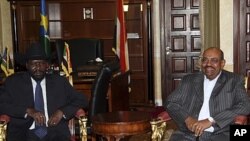Sudan and South Sudan on Tuesday initialed preliminary agreements on two of three contentious issues left over from their breakup last year. Sudan's President Omar al-Bashir is expected to travel to the South Sudanese capital, Juba, soon for a formal signing ceremony.
Talks that began early this month with a shouting match came to a close with a new spirit of compromise. Delegations from Khartoum and Juba sat side by side and initialed accords that commit the two states to work together to settle outstanding border and citizenship issues.
The more difficult issue of oil was put aside until after the nationalities and border agreements are formally signed at a meeting of both countries' presidents. It will be President Bashir's first visit to Juba since South Sudan gained independence last July.
No date for the summit has been set, but officials say it will likely be in few weeks.
The African Union mediator at the talks, former South African President Thabo Mbeki, said the two agreements were reached after the two sides stopped the harsh rhetoric that had characterized early meetings.
"They agreed that they needed to do a broader review of the manner in which the negotiations are being conducted and, therefore, decided that for this particular session during these few days, let us adjourn for a little while the specific discussion on oil and related matters to give themselves time to discuss the broader issue of the manner in which the negotiations have been conducted," said Mbeki.
Early sessions had been characterized by harsh words, particularly from chief South Sudan negotiator Pagan Amum. He had accused Sudan of stealing Southern Sudanese oil and "beating the drums of war" to enhance its negotiating position.
But on Tuesday, as he initialed the nationalities and border accords, Amum spoke of a new spirit of cooperation that he called a “win for both countries.”
"We develop hard positions over time," said Amum. "But in this round, we came to the realization that we need to change our approach. Both the delegation of Sudan and South Sudan approached the panel with this new spirit, new methodology, to approach the negotiations. And the essence of this approach is to work as partners rather than as adversaries."
The two sides remain far apart on their bitter and costly dispute over oil. South Sudan shut down oil production in January, and the pause in talks until after the summit means production is unlikely to restart for months.
The most important achievement at the latest session was the deal that commits both countries to respect the rights of each others' citizens. Chief mediator Thabo Mbeki said that under the agreement, freedom of residence, freedom of movement and property rights will be guaranteed.
"We are very happy about this because it should give an assurance to the populations in South Sudan and Sudan that indeed both countries are determined to protect the interests of the ordinary people in the context of the change that has taken place," he said.
The agreement on borders creates a joint ministerial-level committee that will begin the work of demarcating stretches of the border that are not in dispute.
Mbeki said the two sides will convene a high-level security committee meeting before the Juba summit. That committee is charged with monitoring a non-aggression pact signed earlier this year. Each side has accused the other of violating the accord.
News
Sudan, South Sudan Presidents to Meet




